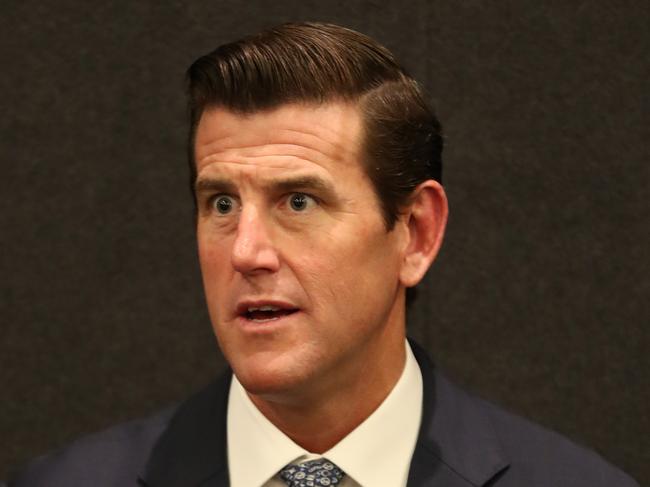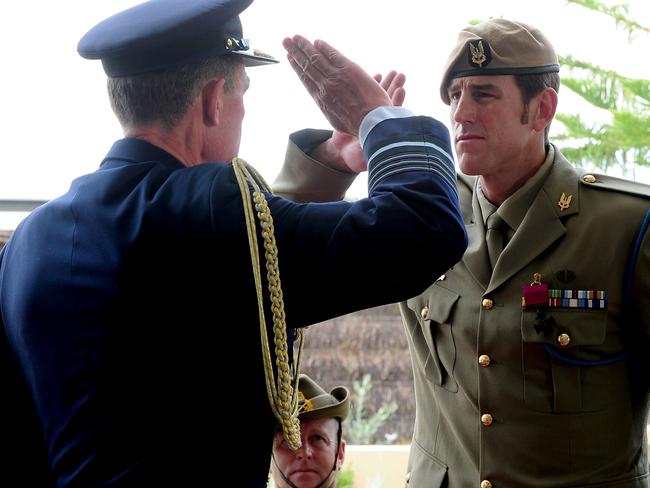Newspapers’ bombshell claim in legal fight with Ben Roberts-Smith
Ben Roberts-Smith wiped sensitive information from a laptop that related to his legal battle over war crimes allegations, a court has been told.
Ben Roberts-Smith has been accused of wiping a laptop that potentially held critical evidence as his courtroom showdown with Nine newspapers nears.
The highly decorated ex-soldier is suing The Age and Sydney Morning Herald over a series of reports that aired allegations relating to his deployment in Afghanistan.
The Victoria Cross recipient has denied the allegations and is suing for defamation, claiming the reports falsely painted him as a war criminal.
Nine has said it will vigorously defend the claim.
On Tuesday, the newspapers’ barrister Lyndelle Barnett told the Federal Court that Mr Roberts-Smith had wiped a laptop just days after he was issued a notice to produce it.
However, Mr Roberts-Smith’s lawyers said there was nothing “sinister” in his actions, telling the court he deleted the information when he was in the process of buying a new computer.
The court has previously been told that Mr Roberts-Smith buried a USB drive inside a pink children’s laptop in his backyard.
It was alleged in a report that the USB contained classified documents and videos that could relate to alleged war crimes.
The court was told that Mr Roberts-Smith removed the USB from his backyard in June last year.
When Nine’s lawyers issued a notice to produce the external drives, they were told that the information had been transferred to a computer.
But Ms Barnett told Justice Anthony Besanko on Tuesday that late last week they had been informed that the computer had been wiped.

“We then sought the laptop with a view to it being examined by an expert and were told on Friday night that the applicant has wiped the hard drive of that laptop very recently, on the 17th of April,” Ms Barnett said.
“Nonetheless, we still press for production of the laptop.”
The court was told that the computer could contain information that would be subject to national security issues, and Nine’s lawyers were pushing for it to be examined by an independent expert with the relevant government clearance.
“(The laptop being wiped) did occur five days after we wrote to the applicant to retain documents associated with the USB,” Ms Barnett said.
“We are concerned about the hard drive having been wiped in those circumstances and (it is) something we wish to explore.”
However, Mr Roberts-Smith’s barrister Bruce McClintock said there was nothing nefarious about the computer being wiped clean.
“There’s nothing sinister in what occurred,” Mr McClintock said.
“My client was in the course of buying a new computer and trading in the old one. That’s the reason for these events.”

He added that the USB was still in the possession of his instructing solicitor and it could still be produced to Nine’s lawyers however was the subject of a national security application from the commonwealth.
He also said he consented to the laptop being turned over and examined.
Barrister Joe Edwards, appearing for the commonwealth, expressed concern that there would be sensitive information on the laptop’s hard drive and was working to have the matter resolved.
Ms Barnett said they were anxious to have it examined prior to Mr Roberts-Smith taking the stand when his trial begins in less than two weeks.
The newspaper articles, published in 2018, contained allegations that the former SAS corporal kicked a handcuffed Afghan civilian, Ali Jan, off a cliff in 2012.
Mr Roberts-Smith’s lawyers on Tuesday told the court that journalist Nick McKenzie had deleted a recorded interview with Mr Jan’s wife.
“There is a significant issue about the destruction of documents by the respondents,” Mr McClintock said.
“We have not been told when these documents were destroyed. And while I don’t like these things to be done in a half-baked way, I do want to take this matter further.”
Mr McClintock said he would issue a notice to produce an affidavit setting how and why the recordings were deleted.
However, Ms Barnett said the recordings, made on an iPhone, were deleted months prior to the stories being published and well before the defamation proceedings began.
“We reject entirely that there’s anything nefarious about these documents … being deleted,” Ms Barnett said.
“As I understand it, interviews with Ali Jan’s relatives were taken on an iPhone and sometimes videos might be started and stopped.
“You might have one short video with nothing relevant. And those were the kinds of videos which were deleted.”
The trial is scheduled to begin in Sydney on June 7.



